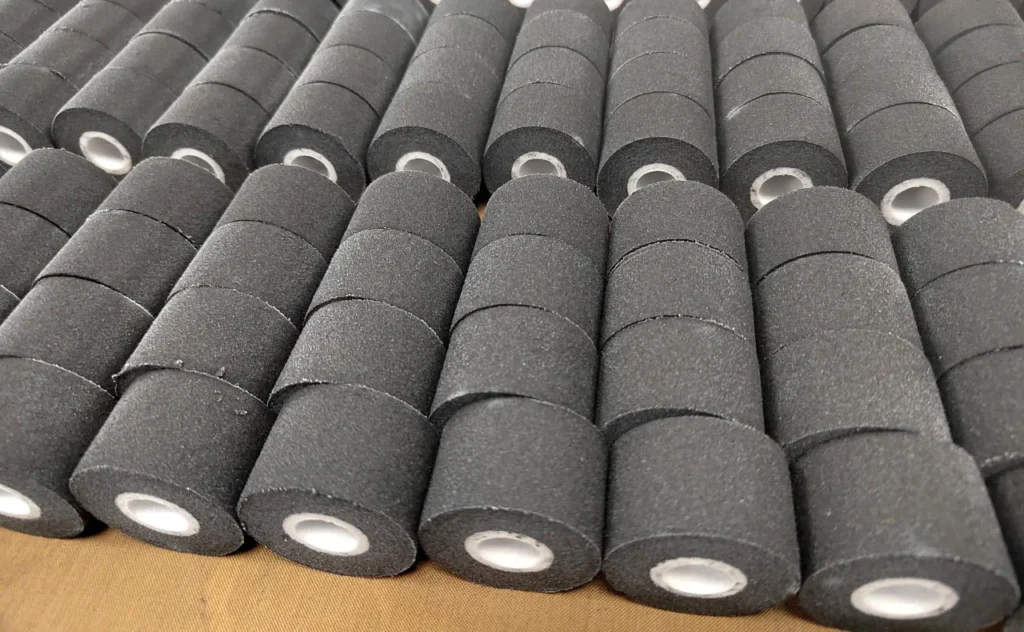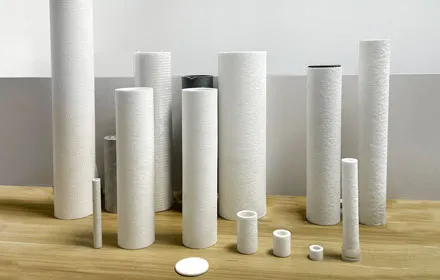Coconut shell activated carbon is often considered the best choice for cleaning water and air. Why? Because it has just the right mix of tiny pores, hardness, and stability. This means:
Longer-lasting filters – it doesn’t wear out quickly.
Removes chlorine & bad smells-Makes water and air taste fresher and cleaner.
But other types of activated carbon, like those made from wood or coal, can also clean water by removing chlorine, chemicals, and pollutants. However, coconut shell carbon is extra good at catching tiny impurities, thanks to its fine pores, high purity, and being eco-friendly (since it comes from a natural, renewable source)
If you’re making or buying activated carbon fiber filter cartridges, knowing the differences helps you pick the best one for your needs.
What Is Activated Carbon and How Does It Work?
Activated carbon is a special type of carbon with lots of tiny holes inside. These holes trap dirt, chemicals, and smells from water or air (this is called adsorption-where things stick to the surface instead of being soaked in like absorption).
What affects how well it works?
Surface area (More tiny holes = better at cleaning)
Pore size (Tiny pores catch small impurities, bigger ones catch larger molecules)
Surface chemistry (Special chemical properties that help grab contaminants)
These traits depend on what the carbon is made from (like coconut shells, wood, or coal) and how it’s processed.

Main Types of Activated Carbon
Different raw materials produce carbons with different pore structures and strengths.
1. Coal-Based Activated Carbon
Coal-based carbon has been used for decades in industrial water and air purification. It typically has a mix of micropores and mesopores and performs well in general-purpose filtration. However, it may contain trace metals or sulfur, and its production process is less environmentally friendly.
2. Wood-Based Activated Carbon
Wood-based carbon, including wood fiber carbon, tends to have more mesopores and macropores. This makes it suitable for adsorbing larger organic molecules, colors, and odors. It is lightweight and renewable, but softer and more prone to producing dust during use, leading to shorter filter life in compact cartridges.
3. Coconut Shell Activated Carbon
Coconut shell carbon is made from discarded coconut shells—a renewable agricultural by-product. After carbonization and activation, it develops a dense microporous structure. This type of carbon is exceptionally hard, dust-free, and has a uniform pore distribution, making it ideal for removing small organic molecules, chlorine, trihalomethanes, and volatile organic compounds (VOCs) in drinking water.
Why Coconut Shell Carbon Performs Better
Microporous Structure for Fine Adsorption
Coconut shell carbon has the highest percentage of micropores. These tiny pores capture small molecules that cause unpleasant tastes, odors, and residual chlorine in tap water. This structure makes it especially effective in drinking water purification compared to wood-based carbon, which favors larger pore sizes.
Exceptional Hardness and Low Dust
During filter cartridge manufacturing, mechanical strength matters. Coconut shell carbon is naturally hard and resistant to abrasion. This prevents carbon fines from breaking off and clouding the water. It ensures better flow consistency, protects downstream filter layers, and extends the filter’s operational life.
Stable Quality and High Purity
Coconut shells have uniform density and fewer impurities than coal or wood. This results in consistent activation performance and minimal mineral residues. For filter manufacturers, this means reliable adsorption characteristics from batch to batch.
Neutral Taste and Odor
Unlike some other carbons that may leave a faint “carbon” flavor, coconut shell carbon delivers a neutral taste. This makes it ideal for point-of-use water filters where taste improvement is a key goal for consumers.
Longevity and Performance Stability
Thanks to its hardness and pore structure, coconut shell carbon maintains its adsorption efficiency longer under continuous flow. For end users, this translates into fewer filter replacements and more consistent water quality over time.
The Role of Pore Structure in Adsorption
Not all contaminants are the same size, and this is why pore structure is critical.
| Carbon Type | Dominant Pores | Best For | Typical Use |
| Coconut Shell | Micropores (<2 nm) | Small organic molecules, chlorine, and VOCs | Drinking water, ACF cartridges |
| Wood-Based | Mesopores (2–50 nm) | Small organic molecules, chlorine, and VOCs | Drinking water, ACF cartridges |
| Coal-Based | Mix of micro & mesopores | General-purpose adsorption | Industrial water treatment |
This table shows why coconut shell carbon shines in fine purification tasks, particularly in home and commercial water filters.
Environmental Advantages
Renewable resources
Coconut shells are the natural waste produced during the processing of coconuts. Turning them into activated carbon not only reduces agricultural waste but also provides environmentally friendly raw materials. Therefore, coconut shells are regarded as one of the most sustainable carbon sources.
Lower carbon footprint
Compared to coal-based activated carbon, coconut shell activated carbon has a lower emission of greenhouse gases during the production process, and the activation process is cleaner and consumes less energy, thereby reducing the environmental impact of filter core manufacturing.
Supporting the local economy
The production of coconut shell activated carbon can help agricultural communities in tropical regions transform the discarded coconut shells into valuable resources, bringing about dual benefits of economic and environmental significance.
Coconut Shell Carbon in Water Purification
Effective Chlorine Removal
Coconut shell carbon reacts with free chlorine, neutralizing it and removing the unpleasant odor and taste from tap water. Its high surface area ensures that even trace chlorine levels are efficiently reduced.
Adsorption of Chemical Contaminants
It can adsorb a wide range of organic chemicals, pesticides, and disinfection by-products (such as THMs). This makes it especially useful for improving the safety of municipal and groundwater supplies.
Integration in Composite and ACF Filter Cartridges
Coconut shell carbon can be combined with various materials to create multi-layer composite filter elements, such as polypropylene melt-blown fibers and ceramic layers. In ACF filter components, it can achieve rapid adsorption and high filtration capacity within a compact design.
Safe for Household Applications
It contains no harmful additives and does not release any secondary pollutants into the filtered water. Therefore, it is very popular in home water filtration.
Comparing Performance Metrics
| Performance Factor | Coconut Shell Carbon | Wood-Based Carbon | Coal-Based Carbon |
| Hardness | High | Low | Medium |
| Dust Level | Very Low | High | Medium |
| Micropore Density | Very High | Moderate | Moderate |
| Taste/ Odor Impact | Neutral | Slight | Slight |
| Lifespan | Long | Short | Medium |
| Sustainability | Excellent | Good | Poor |
Coconut shell carbon consistently performs better across most metrics relevant to drinking-water filtration and compact cartridge manufacturing.
Why Filter Manufacturers Prefer Coconut Shell Carbon
Reliable Sourcing and Quality Control
Coconut shells are available in a consistent supply from tropical regions. Manufacturers can rely on steady availability and uniform properties, ensuring stable product quality.
Easy to Process in Cartridge Production
The fine granule uniformity of coconut shell carbon simplifies packing, extrusion, and sintering processes during filter production. It allows manufacturers to maintain tight flow-rate and pressure specifications.
High Consumer Satisfaction
Filters made with coconut shell carbon often receive better user feedback. The water tastes fresher, the flow remains stable, and filters require less frequent replacement, enhancing customer trust and brand reputation.
The Role of Activated Carbon Fiber (ACF) Technology
Activated Carbon Fiber (ACF) represents the next evolution of activated carbon materials. Compared to granular or powdered carbon, ACF has:
- Faster adsorption kinetics
- Higher surface exposure
- Lower pressure drop
When made from coconut shell–derived carbon, ACF benefits from high purity and fine micropore distribution, enabling even faster and more efficient removal of organic contaminants. For compact filter cartridges, this combination means superior flow, extended life, and better overall filtration performance.
When Other Carbons May Be More Suitable
While coconut shell carbon offers many advantages, it’s not the only solution for all filtration needs.
- Wood-based carbon performs well in air purification and decolorization processes where larger molecules are present.
- Coal-based carbon is often used for industrial wastewater or chemical processing due to its cost efficiency and broad pore distribution.
In consumer water filters, though, where fine organic removal, taste improvement, and compact design are key, coconut shell carbon remains the top performer.
Consumer Benefits at a Glance
- Cleaner, better-tasting water – eliminates chlorine and odor effectively.
- Longer filter lifespan – reduces replacement frequency and maintenance cost.
- Eco-friendly choice – made from renewable coconut shells.
- Safe and natural – contains no harmful chemicals or additives.
- Reliable performance – stable flow and consistent purification results.
These advantages make coconut shell carbon the leading choice for consumers seeking both quality and sustainability.
Conclusion
Coconut shell carbon stands out among various activated carbons due to its unique fine and dense pore structure, high hardness, stable purity, and renewable raw materials. Although wood-based and coal-based activated carbons also play important roles in specific industrial and commercial environments, coconut shell carbon has the most balanced performance in drinking water and household filtration.
For consumers, coconut shell carbon means safe, clean, and excellent-tasting water.
For filter cartridge manufacturers, coconut shell carbon means stable quality, long service life, and less environmental impact.
Therefore, coconut shell carbon has always been regarded as the best activated carbon in all industries and even globally.

